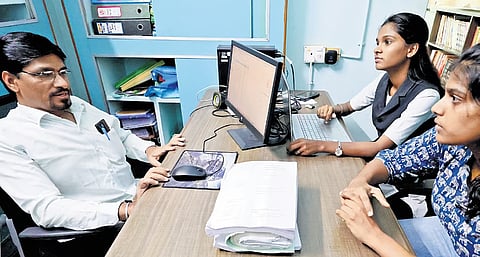

CHENNAI: The smile didn’t come all at once. It unfolded slowly — hesitant, almost startled — across the face of a ten-year-old girl from a small village near Melur.
Only months earlier, her world had shattered when her mother was murdered by her father. School became impossible; each day felt fragile and uncertain.
Then, after months of battling bureaucracy her grandparents could barely understand, the government’s victim compensation order finally arrived.
For the family, it brought a measure of stability. For the little girl, it meant something far greater — an assurance that tomorrow might be gentler than yesterday.
That moment of relief was made possible by a small team from Global Network for Equality (GNE)- India, a Tirunelveli-based NGO that stepped into the family’s confusion with clarity and care.
They helped the grandparents navigate legal procedures, and ensured the young girl returned to school. Across Tamil Nadu, hundreds of children like her are finding steadier ground because someone chose to notice them.
That someone is KR Raja, lawyer at the Madurai High Court and founder of GNE. Raja’s resolve began long before he entered a courtroom.
At eight months old, a severe fever paralysed both his legs, plunging his parents — who ran a modest grocery shop in a village in Kallakurichi — into despair.
Neighbours whispered cruelly that his mother had caused his disability. Overwhelmed by poverty and stigma, she came close to ending her life when Raja was six.
He remembers pleading with her, promising, “I will grow up and take care of the family.”
That promise, he says, became the compass for his life. But his childhood offered little protection from cruelty.
Raja still recalls relatives debating, in chilling calm, whether poisoning him and his sister would spare the family future hardship. The words seared themselves into him.
Instead of turning him bitter, they solidified his conviction that no child should be punished for circumstances they never created.
That belief resurfaced years later at Pondicherry University, where Raja pursued his MSW.
Interviewing 70 prisoners for a research paper, he met a life convict who hadn’t seen his children in seven years. When Raja traced them, he found they had slipped into child labour. A local school refused them admission: “They are children of a murderer. Who will answer tomorrow?” That rejection, he says, felt like a spark landing on dry grass.
If society could turn away so easily, someone had to turn toward these kids with force. After completing a leadership programme at Kanthari in Kerala, Raja followed that spark. In 2012, he founded GNE-India and began working in Palayamkottai Central Prison.
There, he met more than 80 inmates convicted of murdering their spouses and realised their children were scattered across districts with no support. Determined to locate them, he travelled 2,933 kilometres across Kanniyakumari, Tirunelveli and Thoothukudi, identifying 310 children living in severe neglect.
Since 2018, GNE has identified more than 870 such children, helping them re-enter school or college, arranging scholarships and fee waivers, offering trauma counselling, and guiding them through career decisions.
When he highlighted that children could meet jailed parents only during school hours, the government approved Sunday visitation statewide.
According to GNE’s findings, children of crime victims face triple the mental health risks of their peers and are seven times more likely to drift toward crime. “If we want a society free of violent crimes, we must show these invisible children the right path,” Raja says.
Kids who once lived in the shadows of trauma now serve in the Indian Army, work in multinational companies, practise law, or become the first in their families to graduate.
His message is simple, look again at the lives you’d rather not see. Because true justice is not measured by the weight of punishment we mete out to the guilty, but by the fierce, unflinching care we extend to the innocent — especially when they are small, grieving, and still daring to smile.
Contact: KR Raja +91 99629 81392
The story is reported by Rajalakshmi Sampath for The New Indian Express
